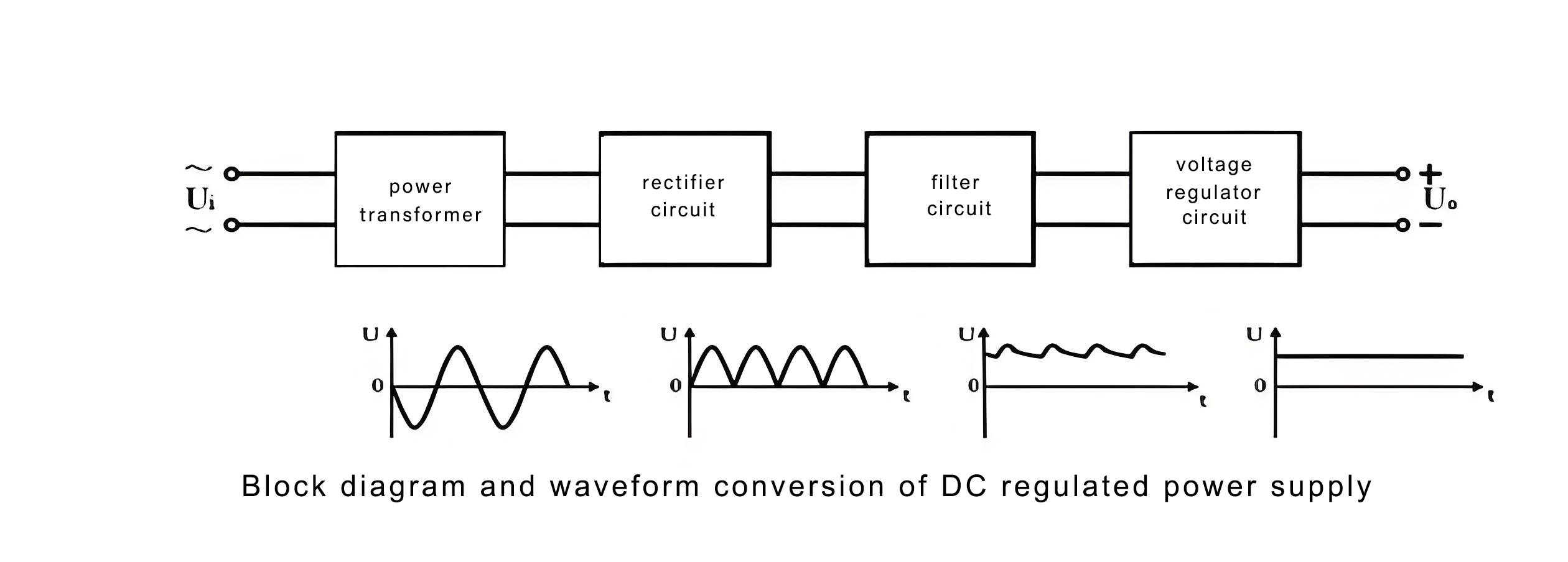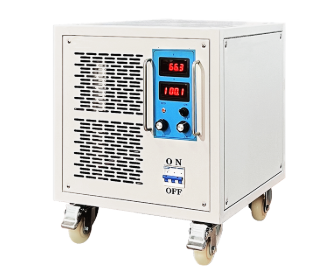what is a DC power supply?
A DC power supply or A DC power source is an electrical device that converts AC power from a power source into a stable DC output. It's got all sorts of bits in it, like transformers, rectifiers, filters, and regulators, which are used to convert and stabilise the input AC voltage to the desired DC voltage and current levels. DC power supplies are used a lot in all sorts of electronic devices and systems that need stable and regulated DC power, like in electronic testing and industrial applications.
The working principle of dc power supply.
The main function of a DC power supply is to provide stable DC voltage for various electronic devices. So how does a DC power supply actually work? It's actually quite simple. The working principle of dc power supply involve several stages:
First is the transformer stage, where the AC power from the main power supply first passes through a step-down transformer. This transformer reduces the voltage level to a range suitable for further processing, lowering the high-voltage AC power to the voltage value we need, such as converting 220V to 12V.

Next, the alternating voltage is converted into pulsating direct voltage through a diode. The diode allows current to flow in only one direction, effectively converting the negative half-cycle of the alternating waveform into a positive half-cycle. This process is called rectification. Like a bridge rectifier circuit, it converts the alternating current, which originally alternates between positive and negative, into pulsating direct current flowing in a single direction.
The rectifier output pulsating direct current contains ripple, i.e. undesirable fluctuations in voltage. To eliminate these ripples, filter capacitors are required, using components such as capacitors and inductors. Capacitors store charge at the peaks of the pulsating waveform and release charge at the troughs, thereby smoothing the direct current output and reducing fluctuations.
Finally, there is voltage regulation control (due to changes in load or input voltage, the smoothed DC voltage may still not reach the expected level). This is achieved through voltage regulation chips or feedback circuits to ensure that the output voltage remains stable at the set value and does not fluctuate significantly due to changes in load.
The advantages of dc power supply.
High stability: the foundation of precise power supply
DC power supplies provide stable and consistent output voltages, which is critical for some precision instruments, as even minor fluctuations can cause deviations in experimental data and test results. This makes sure it's reliable and accurate for all sorts of applications.

High efficiency: the benchmark for energy conversion
By rapidly switching high-frequency switching devices, the input AC power is efficiently converted into DC power, which significantly reduces energy loss during the conversion process. This high-efficiency conversion feature has two main benefits. Firstly, it can reduce energy costs a lot, especially for large industrial equipment and data centres that are running 24/7. This can save you a lot of money on electricity bills over time. Secondly, it can stop the equipment getting too hot when it is being used. One of the main things that can cause electronic components to fail or wear out more quickly is too much heat. High-efficiency power supplies are great because they keep your equipment cool, meaning it will last longer. This also means you won't need to upgrade your equipment as often, and it'll be cheaper to maintain.
Safety: Smart protection guarantees
DC power is often considered safer than AC power because it doesn't have the same alternating voltage and frequency as AC power. This reduces the risk of electric shock and makes it safer to use and run DC-powered equipment. DC power supplies are pretty safe, with all sorts of protection mechanisms included. They've got overload protection, short-circuit protection, temperature monitoring and fault diagnosis. If the equipment encounters anything unusual, like an overload or a short-circuit, the power supply can spot the abnormal current right away and quickly cut off the output circuit. This stops the equipment getting damaged by too much electricity and potential safety problems, like fires.
There are many other advantages of DC power supplies that we will not list here. Interested readers can visit our other blogs or contact us directly for more details. In short, DC power supplies play an indispensable role in modern industrial systems and frontier technology fields. They provide precise power supply for scientific research experiments, driving the emergence of research results and technological progress. In industrial production, they help enterprises improve production efficiency, reduce operational costs, enhance safety, and achieve sustainable development, among other outstanding contributions.








